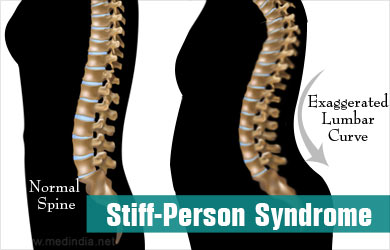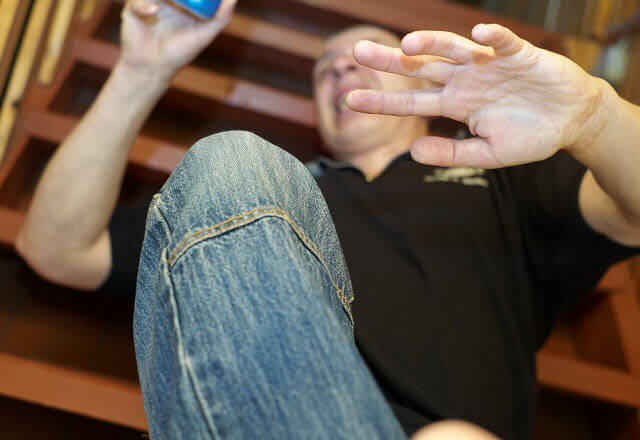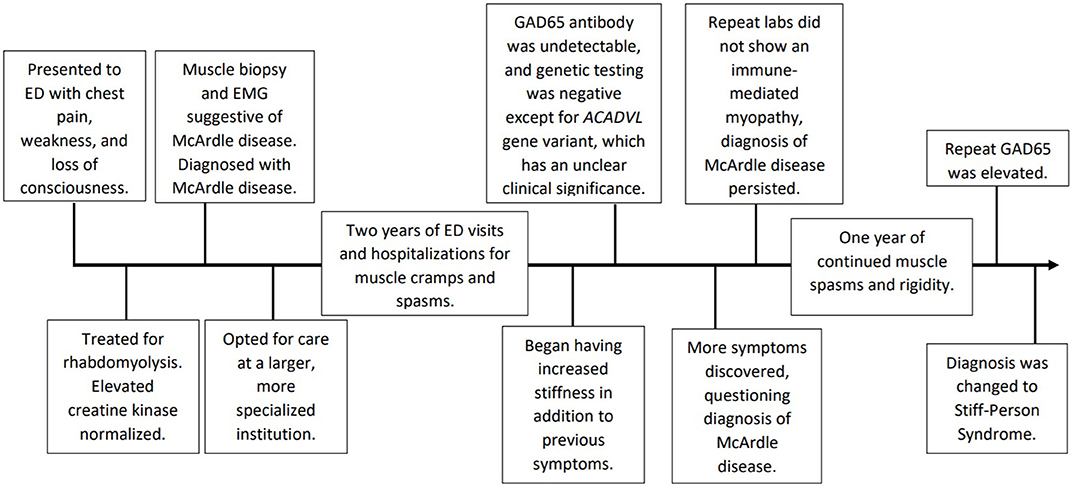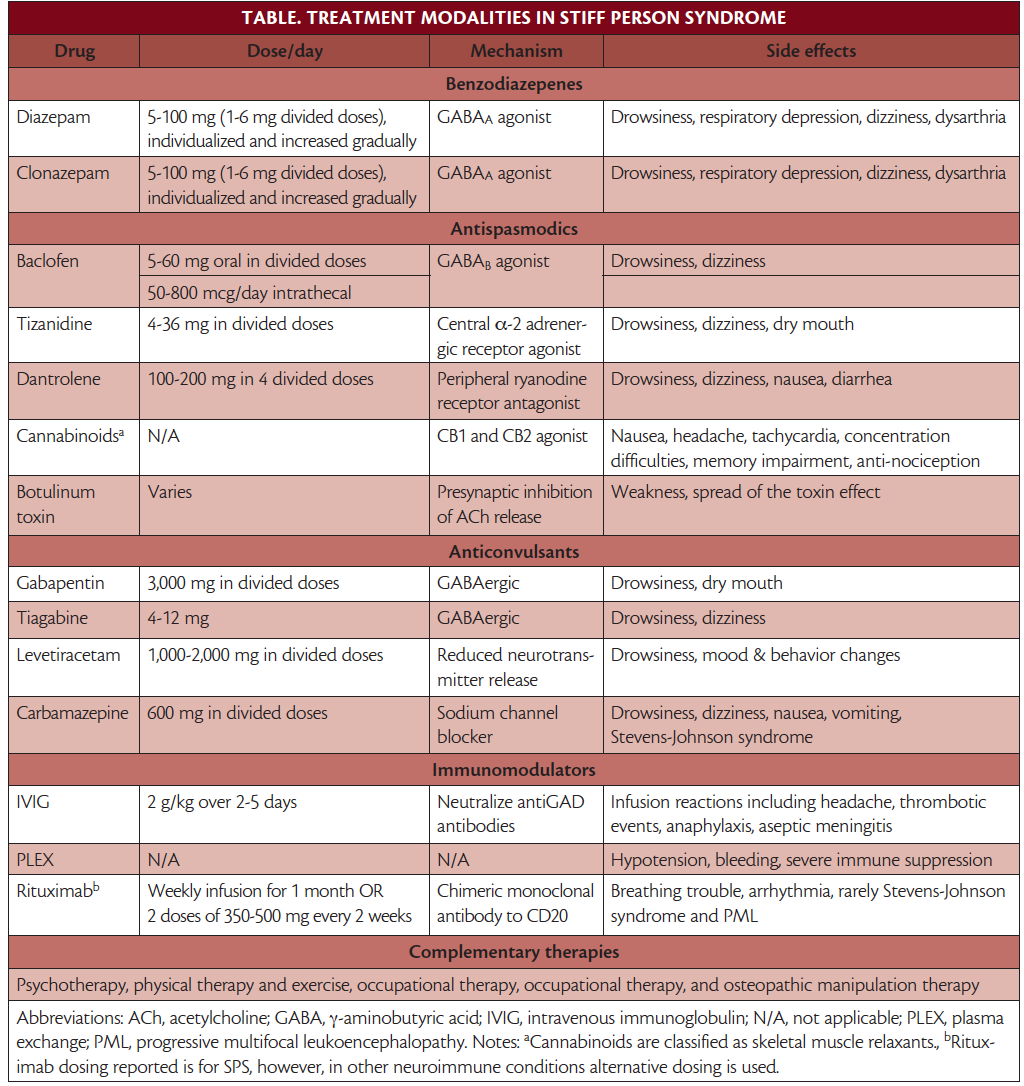Stiff person syndrome
Chronic pain impaired mobility and lumbar hyperlordosis are common symptoms. Affected individuals also develop involvement of the brainstem which can cause myoclonus.

Stiff Person Syndrome
SPS is labeled as a rare disease.

. Stiff-person syndrome also known as stiff-man syndrome is a rare neurologic disorder of unclear cause characterized by progressive rigidity and stiffness. Symptoms may include extreme muscle stiffness rigidity and painful spasms in the trunk and limbs severely impairing mobility. Tests for diagnosing stiff person syndrome may include the following.
Spasms can generate enough force to fracture bone. SPS is strongly correlated with autoimmune diseases and it is usual to find high titers of antibodies against acid decarboxylase GAD65. Stiff-person syndrome SPS is a rare and disabling central nervous system disorder with no satisfactory treatment.
Muscle rigidity sporadic muscle spasms and chronic muscle pain characterize SPS. Muscle spasms can be so violent they can dislocate joints and even break bones. The stiffness primarily affects the truncal muscles and is superimposed by spasms resulting in postural deformities.
But more people are affected than reported due to misdiagnoses. Stiff person syndrome is characterized by muscle rigidity and spasms heightened sensitivity to stimuli such as sound and lights and emotional distress that can cause muscle spasms according to. Serum anti-GAD glutamic acid decarboxylase 65 antibody serum amphiphysin antibody several other serum autoantibodies hemoglobin A1c and vitamin levels lumbar puncture MRI of the brain and spine neurophysiological studies.
Certain cancers including breast lung kidney thyroid colon and Hodgkins lymphoma. Stiff Person Syndrome SPS is an autoimmune and neurological disorder that can make the muscles in the torso and limbs alternate between rigidity and spasms. SPS is characterized by fluctuating muscle rigidity in the trunk and limbs and a heightened sensitivity to stimuli such as noise touch and emotional distress which can set off muscle spasms.
Jerking stiff-person syndrome is characterized by muscles stiffness and spasms usually affecting the legs. Stiff person syndrome SPS is a neurological disease with autoimmune features. Autoimmune disorders including diabetes thyroiditis vitiligo and pernicious anemia.
Myoclonus is a general term used to describe the sudden involuntary jerking of a muscle or group of muscles caused by muscle contractions positive myoclonus or. Symptoms include muscle spasms hyper-rigidity debilitating pain and chronic anxiety. SPS occurs in about one in a.
Stiff person syndrome SPS is a rare progressive syndrome that affects the nervous system specifically the brain and spinal cord. Stiff person syndrome is more likely seen in people with certain types of diseases including. The cause of this extremely rare disease is still unknown.
Stiff-person syndrome SPS is a rare neurological disorder with features of an autoimmune disease.

Pdf Physical Therapist Management Of Stiff Person Syndrome In A 24 Year Old Woman Semantic Scholar

The Stiff Person Syndrome Research Foundation
Living With A Rare Disease Known As Stiff Person Syndrome

Stiff Person Syndrome Causes Symptoms Diagnosis Treatment Prevention

Cureus Recent Advances And Review On Treatment Of Stiff Person Syndrome In Adults And Pediatric Patients

What Is Stiff Person Syndrome Cbc News

Stiff Person Syndrome Rare Disease Day Australia

Stiff Man Syndrome Presenting With Low Back Pain Annals Of The Rheumatic Diseases

Pdf Stiff Person Syndrome Insights Into A Complex Autoimmune Disorder

Stiff Person Syndrome Sps Diagnosis And Management Grepmed

Stiff Person Syndrome Center

Frontiers Mcardle Disease Vs Stiff Person Syndrome A Case Report Highlighting The Similarities Between Two Rare And Distinct Disorders

Stiff Person Syndrome Glossary

Stiff Person Syndrome Top 25 Questions Stiff Person Syndrome Map Diseasemaps

Stiff Person Syndrome Insights Into A Complex Autoimmune Disorder Journal Of Neurology Neurosurgery Psychiatry
/cloudfront-us-east-1.images.arcpublishing.com/pmn/P3B5LHOJOZE57I7LOVHP3V2XHQ.jpg)
Zbvand9b9dr0qm

Stiff Person Syndrome Practical Neurology